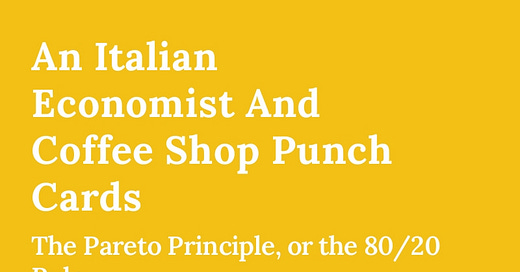In 1906, an Italian economist named Vilfredo Pareto realized that 80% of land in Italy was owned by only 20% of its citizens.
Now, you might think (as I first assumed) that such a discovery would lead to some necessary change regarding wealth disparity or land use laws. And maybe it did that, too. But social change is not what Vilfredo Pareto is known for impacting.
Instead, he changed the perspective we have on effort and success ratios.
What in the heck does that mean? Let me attempt to explain:
Researchers studied Pareto’s observation more broadly and soon realized that land ownership was not the only place the 80/20 ratio appeared. You know when you buy a new car and suddenly start seeing that model or color everywhere? Researches started seeing the 80/20 ratio all throughout society.
Thus the “Pareto Principle”—also known as the 80/20 rule—was born. This rule essentially claims that 80% of all consequences come from only 20% of action/effort.
80% of a business’ sales come from 20% of customers
80% of crime is committed by 20% of the population
80% of your wardrobe is worn only 20% of the week (or, vice versa—your favorite 20% of your clothes are what you wear 80% of the time.)
Obviously, there are some oversimplifications here that may not be exactly statistically true, but the concept had a significant impact on the politics, business practices, and daily habits of the 20th century.
Think about it in your own life. Do you see the 80/20 pattern? What about in your author career?
The 80/20 Rule For Authors:
80% of your book sales are purchased by 20% of your fans
80% of your final draft came from 20% of your writing time (yikes!)
80% of your author income comes from only 20% of your books
80% of your social media engagement comes from only 20% of your followers
80% of your book’s content included only 20% of all your research
80% of your career growth happened from only 20% of your marketing strategies
Now, you might think this is a great hack for easily maximizing profit. After all, if you know what 20% makes you successful, you could exclusively focus on that. Cut all the pork from your to-do list! No more waste or distraction!
But therein lies the particular cruelty of this principle: it keeps subdividing. By which I mean: if your 20% becomes what you exclusively do, then it is now your 100%. And that new 100% is also subject to the 80/20 rule. Only 20% of that effort is now yielding the majority of your results.
Are you confused yet?
»You can never exclusively focus on your best 20%, but you CAN identify that 20% and do your best to nurture it.«
Reward perks are a great example of how the business community tried to nurture this. Why do you think your favorite coffee shop gives you a punch card for a free cup of coffee after a certain number of orders? As a rule, those reward perks are not an overwhelmingly successful marketing strategy.
Most of us—yes, me especially—lose the card. Or, *cough, cough*, we carry it around in our purse for a decade until its faded almost beyond recognition and then it turns out that coffee shop was actually bought out by someone else many years ago while we unnecessarily carried around a defunct card in our wallet every day for longer than a two-term president is in power.
Just as a hypothetical example, I mean…
But if reward perks don’t work, then why do so many major businesses keep doing them?
If you are one of the organized persons who actually redeems that punch card, then you are likely that coffee shop’s 20%: the base of most loyal customers that they make 80% of their money off of.
The punch card does a few things for them:
Identifies you. Now they know you are one of their 20% and they can market accordingly.
Offers sincere gratitude. You are keeping that business afloat. Hell yeah, you deserve a free cup of coffee!
Entices customers on the fringes to be part of the 20%. Maybe you were actually in the Top 23% of their returning customers, but hey—you don’t want this great punch card to go to waste, so you go more often, thus becoming part of the Top 20%.
Should Authors Offer Punch Cards To Fans?
As fun as that would be, I am not suggesting you create punch cards for your fans. Especially since not all of you are responsible for the sales of your book and thus can’t offer something like that.
But the concept is golden: Figure out the most successful 20% of your marketing and do what you can to identify, reward, and optimize that segment.




I find this principal comforting, because it helps me remember that that 80% wasn't a waste of time, it was necessary to get to the 20%. If you have any tips or suggestions for authors to find what that 20% is for them, I would love your wisdom on that! Maybe a whole post?